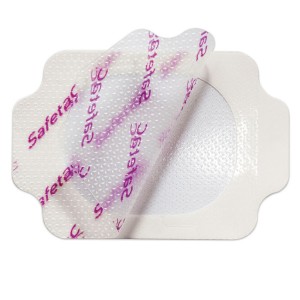 Prophylactic use of Mepitel Film can prevent skin reactions caused by radiation therapy, especially the development of moist desquamation, as concluded by a study conducted at the University of Otago in New Zealand. Mepitel Film is a thin, transparent dressing that uses Mölnlycke Health Care’s Safetac technology and, according to the research, may reduce the suffering of cancer patients who experience radiation-induced skin reactions.
Prophylactic use of Mepitel Film can prevent skin reactions caused by radiation therapy, especially the development of moist desquamation, as concluded by a study conducted at the University of Otago in New Zealand. Mepitel Film is a thin, transparent dressing that uses Mölnlycke Health Care’s Safetac technology and, according to the research, may reduce the suffering of cancer patients who experience radiation-induced skin reactions.
When compared to cream-treated skin, the Mepitel Film skin reaction severity was reduced by 92 percent, and it completely prevented moist desquamation. Only 44 percent of the patients in analysis developed a skin reaction under the film, and none of them progressed into moist desquamation. All patients developed some form of reaction on cream-treated skin, which progressed to moist desquamation in 26% of patients.
“Safetac-based soft silicone dressings used in a management setting decrease the severity of radiation-induced acute skin reactions but do not affect moist desquamation rates. Here we investigate the prophylactic use of another Safetac product, Mepitel Film, on moist desquamation rates,” the researchers, led by Dr. Patried Herst, explained in the article “Prophylactic use of Mepitel Film prevents radiation-induced moist desquamation in an intra-patient randomized controlled clinical trial of 78 breast cancer patients,” published online in Radiotherapy & Oncology.
[adrotate group=”1″]
Data from 78 breast cancer patients was examined between October 2012 and April 2013, wherein the scientists divided the lateral and medial halves of the skin areas to be irradiated and performed a randomized analysis of Mepitel Film on one side and aqueous cream on the other side. Researchers used thermoluminescent dosimeters to measure skin dose and RISRAS and RTOG scales to measure skin reaction severity.
Between 80 and 90 percent of breast cancer patients experience radiation-induced skin reactions, which can appear from mild redness to ulceration, with symptoms of pain, burning, and itchiness. This consequence of cancer treatment negatively affects patients’ lives and leads to an increase in suffering, which is why this new discovery may revolutionize the quality of life of radiation therapy patients.


